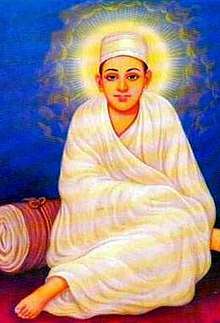Dadu Dayal
Dadu Dayal (Hindi: दादूदयाल Dādūdayāl, 1544—1603) was a poet-sant from Gujarat, India, a religious reformator which have said against formalism and priestcraft.
Dadu Dayal | |
|---|---|
 | |
| Personal | |
| Born | 1544 |
| Died | 1603 |
| Religion | Hinduism |
| Sect | Sant Mat |
| Founder of | Dadupanth |
| Philosophy | Bhakti |
| Religious career | |
| Guru | Kabir, Ravidas, Namdev |
| Literary works | Dadu Anubhav Vani |
Etymology
"Dadu" means brother, and "Dayal" means "the compassionate one".
Early life
He was reputedly found by an affluent business man floating on the river Sabarmati.[1]
Dadupanth
Dadu Dayal later moved to Naraina, near Jaipur Rajasthan, where he gathered around himself a group of followers, forming a sect that became known as the Dadupanth.[1]
Dadupanthis are one of the 7 martial akharas of Vaishnavite Sampradaya of Hindus. Vaishnavism has following four major sects:[2]
- Sri founded by Ramananda, Dadupanthis are one of those 7 martial akharas of Vaishnavite in the sec of Ramanada
- Brahma founded by Madhava
- Ridra founded by Vishnusuvamin
- Sanakadi founded by Nimbarka.
Followers of Vaishnavism are also called Bairagi or Vairagi. Among the Bairagi, those who became part of the military akharas were organised in the 7 akharas founding dates of most of which are unclear. Each of the akhara accepted members from all 4 sects of vaishnavism. Bairagi military akharas generally did not follow the prohibition against eating meat or taking of narcotics.[2]
Dadu Anubhav Vani
Dadu's compositions in Braj language were recorded by his disciple Rajjab and are known as the Dadu Anubhav Vani, a compilation of 5,000 verses. Another disciple, Janagopal, wrote the earliest biography of Dadu.[3] Dadu alludes to spontaneous (sahaja) bliss in his songs. Much of the imagery used is similar to that used by Kabir, and to that used by earlier Sahajiya Buddhists and Nath yogis. Dadu believed that devotion to God should transcend religious or sectarian affiliation, and that devotees should become non-sectarian or "Nipakh".[4] He has something to say about that:[5]
So kāfir jo bolai kāf; |
The infidel is one who tells a lie; |
Dadupanthi thambas
Dadu had 100 disciples that attained samadhi. He instructed additional 52 disciples to set up ashrams, 'Thambas' around the region to spread the Lord's word. Dadu ji spent the latter years of his life in Naraiana, a small distance away from the town of Dudu, near Jaipur city. Five thambas are considered sacred by the followers; Naraiana, Bhairanaji, Sambhar, Amer, and Karadala (Kalyanpura). Followers at these thambas later set up other places of worship.
Dadupanthi martial akharas
Armed martial akharas were first likely formed by the Dadupantji guru Jait Sahib (1693 - 1734 CE) when he recruited armed Naga sadhus. In 1733, Dadupanthis were tax paying farmers in Jaipur State and martial naga sadhus used employed to enforce the payment of taxes. In 1793, Dadupanthis and Jaipur State had an agreement under which Dadhupanthis provided 5000 armed soldier sadhus to defend the Jaipur State. During the 1857 rebellion, Dadupanthis acted as mercenaries who helped British raj.
Prominent Dadupanthis
Present status
Dadupanth has continued in Rajasthan to the present-day and has been a major source of early manuscripts containing songs by Dadu and other North Indian saints.
See also
- Akhara
- Bhakti movement
- Sampradaya
- Vaishnavism sampradaya
- Shaivism sampradaya
- Dashanami Sampradaya, a sub-sampradaya of Shaivism
References
Citations
- Dadu Hindu saint at Encyclopædia Britannica Online. Retrieved 31 December 2018.
- David N. Lorenzen, 2006, Who Invented Hinduism: Essays on Religion in History, Yoda Press, p.51-65.
- Nayak 1996, p. 96.
- Dadu on Realisation at sahajayoga.org Archived 2011-08-12 at the Wayback Machine
- Upadhaya 1980, p. 10.
Sources
- Lorenzen, David N. (1995). Bhakti Religion in North India: Community Identity and Political Action. New York: SUNY Press. ISBN 978-0-7914-2025-6.
- Nayak, Sujatha (1996). "Dadu Dayal". In Sivaramkrishna, M.; Roy, S. (eds.). Poet-Saints of India. New Delhi: A Sterling Paperback. pp. 90–100. ISBN 81-207-1883-6.
- Sant Dadu Dayal: Encyclopaedia of Saints Series (Volume 25). Eds. Bakshi, S. R.; Mittra, Sangh (2002). New Delhi: Criterion Publications. ISBN 81-7938-029-7
- Upadhaya, K. N. (1980). Dadu the Compassionate Mystic. Punjab: Radha Soami Satsang Beas.